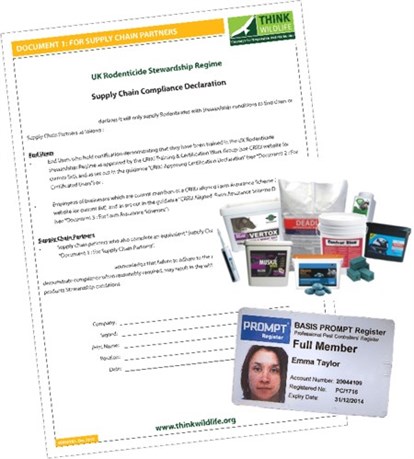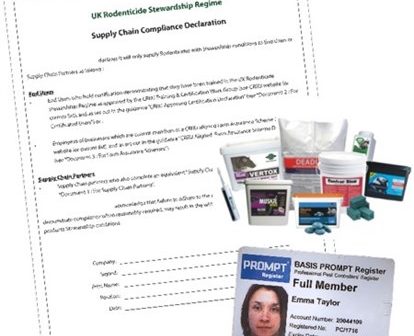Anticoagulant rodenticide products sporting the new, legally-binding stewardship labels are about to start appearing on distributors shelves. That means to purchase and use any of these products pest professionals will need to have completed a certificated user’s point of sale declaration for each distributor they buy product from.
These simple A4 declaration documents, produced by the Campaign for Responsible Rodenticide Use (CRRU) Point of Sale workgroup, have to be kept on file by suppliers. Suppliers must have a completed declaration for each individual customer, along with a copy of that customer’s CRRU-approved proof of competence certificate. There are no exceptions with Internet suppliers also required to hold these documents. Where customers are not known to the supplier, photo ID, such as a BASIS Prompt card, will also be required.
| Get the paperwork sorted now If you’ve not yet sorted out your point of sale declarations and proof of competences then get in touch with your distributors now or you may find yourself unable to purchase product when you need it. Whilst, in theory, you have until 30 September 2016 to continue to buy ‘old’ stocks of pre-stewardship labelled rodenticides, don’t bank on supplies being available. Distributors will want to sell old stocks in advance of that date as they will not want to be left with obsolete products on 1 October. Don’t be surprised either if some distributors decide to bring in stewardship checks as soon as they get their first stocks of stewardship-labelled product. Running the new system will be difficult enough without the added complication of having some anticoagulant rodenticides outside it. To simplify matters for their own staff, they may choose to implement the full stewardship checks, regardless of whether the product being sold is ‘old’ or ‘new’ stock. |
 |
|
Users need to be aware of two dates:
All supported products requiring stewardship labels have now gone through the HSE authorisation system and HSE has published a useful, searchable rodenticide database. Interrogating this database revealed some interesting results:
|
||



